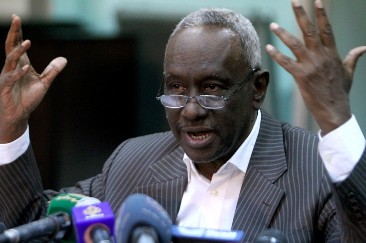Ex-VP Taha denies departure was linked to disagreements within government
December 14, 2013 (KHARTOUM) – Sudan’s former first vice-president, Ali Osman Mohamed Taha, has dismissed speculation of differences between him and president Omer Hassan al-Bashir, as well as former presidential assistant, Nafie Ali Nafie, stressing that the recent changes in government ranks were not the result of an internal coup to replace civilians with military figures.

The biggest surprise in the reshuffle was the departure of the powerful presidential assistant Nafie Ali Nafie from the government and the NCP leadership. The cabinet also witnessed the stepping down of veteran oil minister Awad Ahmed Al-Jaz, who has been a member of government since 1989.
In a TV interview broadcasted jointly by Sudan TV and Ashorooq TV on Saturday, Taha said his relationship with Bashir has always been characterised by respect and appreciation adding that he did not feel over the past years that his boss dealt with him as a president.
“I was dealing with him as a colleague and a brother who is above me in responsibility but between us is a measure of respect and a sense of shared responsibility that makes us partners in decisions and not just [as] a president and vice-president,” Taha said.
“Although according to the constitution I do not have executive powers that allowed me to make the decisions I took, [this was possible because of] trust, respect and [the] working relationship that existed between myself and the president”, he added.
Taha also acknowledged that he did not always see eye to eye with Nafie which he attributed that to difference in style but denied any tensions with him, adding that this has nothing to do with his departure from the government.
“Each one of us belongs to a [different] school in political expression or focusing on some of the issues and not the others, but there is no difference in the overall framework”, the former vice-president said.
He noted that Nafie was his right hand man the whole time during the Naivasha talks which led to the 2005 Comprehensive Peace Agreement (CPA) with the south.
Asked about whether his resignation was to pave the way for him to run for presidency in 2015, Taha said that his stepping down was not a personal decision but related to growing desire for change in the country.
Taha disclosed that he is working with other NCP leaders on proposing more reforms including making amendments to the electoral system to allow for more diverse representation.
He said that more changes in the federal and state leaderships will be forthcoming, as well as a comprehensive review of policies related to issues of peace, war, unifying the national and internal front, the economy and good governance under the supervision of a party commission through dialogue to avoid the mistakes and shortcomings of the past.
Taha also commended the retention of defence minister Abdel-Rahim Mohamed Hussein saying that the latter has generally did a tremendous job despite some military and political failures which should not be blamed solely on him.
He also confirmed that he recommended having Salih replace him given his many good attributes but stressed that this has nothing to do with preparing the military figure to take over from Bashir as was suggested by some observers.
(ST)
